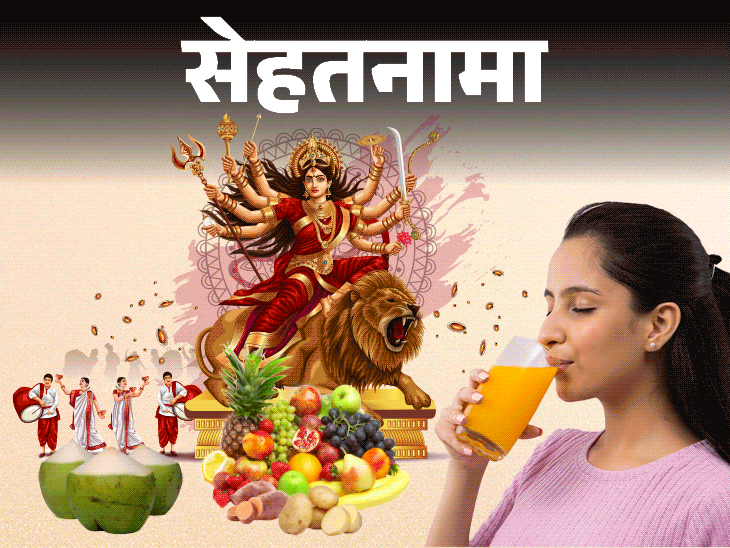October 3 This means Shardiya Navratri started yesterday. In this, different goddesses are worshiped for 9 days. Each day of Navratri symbolizes a different power and accomplishment. People observe fast to please all goddesses and achieve all achievements like happiness and prosperity in life.
The tradition of fasting has lasted for centuries. It is as old as the history of man on this earth. When grains were not discovered, humans went hunting for food. A hunt required continuous hard work for hours and days. Once the hunt was over, it was time to get down to business. Then, when the food ended, the fasting time began because man did not know when he would get the next food, the next prey. The duration of the fast can be from one day to 10 days.
Apart from this, whenever a natural disaster occurred, hunting at that time became a more difficult task. It was believed that nature was angry and because of its anger they could not get food. Therefore, to please nature, they observed fast by giving up food.
When civilization flourished and different religions emerged, this tradition of fasting took on a religious form. However, throughout human history, fasting has been more a symbol of self-discipline, restraint, and introspection than a religious ritual.
During this period, great attention was also paid to eating habits. During this period, only natural elements had their place in the diet.
so today’In the medical file“We will know how Navratri fasting is beneficial for our health. You will also learn that-
What types of fasting traditions exist across all world religions? Does science also consider fasting beneficial? How to plan Navratri fasting for good health?
In this article, we will understand in detail the history of fasting, its scientific analysis and the right way to eat during this period. Before that, see in the chart the great benefits of Navratri fast.
Let’s understand the science behind the points given in the graph:
Beneficial in weight management: During fasting, the fat burning process in the body increases and weight decreases.Detoxification of the body: By giving up food or consuming it in lesser quantities, the process of autophagy occurs in the body, which detoxifies the body.Improves the digestive system: By reducing the workload on the digestive system, it has the opportunity to rest. This strengthens the digestive system.Blood pressure remains under control: Blood pressure remains under control through a healthy diet and reducing salt intake.Heart health improves: Keeping blood pressure under control and reducing triglyceride and cholesterol levels improves heart health.Inflammation reduces: Inflammation decreases due to the reduction in C-reactive protein during fasting.Brain function improves: Fasting accelerates the synthesis of nerve cells, which speeds up and improves brain function.Stress is reduced: Eating simple foods during fasting reduces stress levels.Sleep well: Eating in limited quantities or avoiding eating in the evening while fasting gives rest to the digestive system and leads to better sleep.Get Longer Life: By fasting, all parts of the body have the opportunity to rest. The functioning of the body is organized. This increases both health and lifespan.
Fasting tradition meets scientific standards By giving up food or eating little food during fasting, a special process occurs in our body called “autophagy”. Understand it this way, when our body is not getting enough energy from food due to fasting, then the body gathers energy by eating its weaker and damaged cells. As a result, the healthiest cells remain in the body and we become completely healthy. Japanese scientist Yoshinori Ohsumi was awarded the Nobel Prize in Medicine in 2016 for explaining the science and benefits of this process.
People observe three fasts together during Navratri. During Navratri, people not only exercise restraint when it comes to food but also observe three fasts simultaneously. During this time, purity of mind, words and deeds are taken into account. As a result, physical and mental health remains good.
In Kaikay Vrat, physical violence must be renounced. You must be careful not to do anything that could harm anyone. In Vachik Vrat only true words should be spoken. Apart from this, you should not say words that could hurt someone. In mental fasting, one must let go of thoughts like lust, anger and greed.
See the graph:
Pay special attention to food during Navratri fasting During Navratri, special attention should be paid to food and worship for 9 days. Generally, the rules of fasting are such that they are beneficial for health. If we plan a little in advance for Navratri fasting, there can be many benefits for our health. See in the chart, what to do and what not to do during this period.
When planning meals, it is important to choose foods that will keep the body energized. During this period, include liquid foods in the diet so that the body remains hydrated. Include fresh fruits and vegetables in the diet so that the body is adequately hydrated. amount of fiber. To enhance the taste of food, you can add lemon juice. This will also strengthen the immune system.
There is a tradition of fasting in every religion There is a tradition of fasting in all religions and civilizations around the world. Even before the creation of religion, people around the world kept fasts. When this practice became part of the religion, its methods and reasons changed. The fundamental scientific goal behind all of this is good physical health. There is a tradition of fasting in all religions in the country and the world. See the chart below.
…………………..
Also read these news related to Navratri…
Need News – Maa Durga’s Four Favorite Foods: Goddess Loves Pumpkin, Coconut Barfi and Sweet Potato Kheer, Easy Recipes to Prepare at Home.
If you are fasting on the occasion of Navratri and planning to make offerings to Maa Durga with your own hands, we have brought the recipes of Maa’s most favorite dishes for you. …

